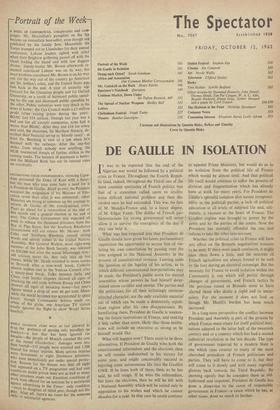DE GAULLE IN ISOLATION
T was to be expected that the end of the I Algerian war would be followed by a political crisis in France. Throughout the Fourth Repub- lic (and, indeed, throughout the Third) one of the most constant spectacles of French politics was that of a statesman called upon to resolve some difficult national problem and then dis- carded once he had succeeded. This was the fate of M. Mendes-France and, to a lesser degree, of M. Edgar Faure. The dislike of French par- liamentarians for strong government will never allow it to survive the emergency of the day if they can help it.
What was less expected was that President de Gaulle should have given his latent parliamentary opposition the opportunity to accuse him of vio- lating his own constitution by passing over the role assigned to the National Assembly in the process of constitutional revision. Leaving aside the question of the legality of his action, as to which different constitutional interpretations may be made, the President's public scorn for elected assemblies whose powers he had himself deter- mined seems cavalier and unwise. The parties and the politicians, for all their irritatingly unrecon- structed character, are the only available material out of which can be made a democratic repub- lican regime after his own disappearance. By humiliating them, President de Gaulle is weaken- ing the future institutions of France, and making it less, rather than more, likely that those institu- tions will include an executive as strong as he himself would like.
What will happen now? There seem to be three alternatives. If President de Gaulle wins both the constitutional referendum and the elections, then he will remain undisturbed in his victory for some time, and might conceivably succeed in injecting some autonomous life into the Gaullist UNR. If he loses both of them, then, as he has said, he will resign. If he wins the referendum, but loses the elections, then he will be left with a National Assembly which will be united only in opposition to his wishes and which he cannot dissolve for a year. In that case he could continue to appoint Prime Ministers, but would do so in an isolation from the political life of France which would be almost total. And that political life itself would continue to suffer the process of division and fragmentation which has already been at work for many years. For President de Gaulle's splendid isolation also means irresponsi- bility in the political parties, a lack of political education at all levels of national life and, ulti- mately, a vacuum at the heart of France. The Gaullist .regime was brought to power by the army and by the parties of the centre. Now the President has mortally offended the one and refuses to take the other into account.
Whether the political crisis in France will have any effect on the Brussels negotiations remains to be seen. If there were much confusion, it might slow them down a little, and the interests of French agriculture are always bound to be well to the fore during an electoral campaign. But the necessity for France to avoid isolation within the Community is one which will persist through changes of government, and French tactics lit the previous round in Brussels seem to have alerted those who desire a rapid end to uncer- tainty. For the moment it does not look as though Mr. Heath's burden has been much increased.
In a long-term perspective the conflict between President and Assembly is part of the process by which France must create for itself political insti- tutions adapted to the latter half of the twentieth century and to a country which has had a second industrial revolution in the last decade. The type of government required by a modern State is one which runs counter to many of the most cherished prejudices of French politicians and parties. They will have to come to it, but they will come to it slowly and with many regretful glances back towards the Third Republic. By showing openly that he considers them as old- fashioned and impotent, President de Gaulle has done a disservice to the cause of responsible government in France—a cause which he has, at other times, done so much to further.






































 Previous page
Previous page